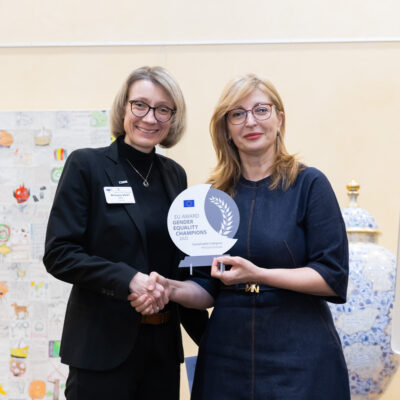Why are we persuaded by certain narrative explanations and not by others? A research team at Bielefeld University is investigating this question. Economists Professor Dr Manuel Förster and Dr Gerrit Bauch from the Institute of Mathematical Economics (IMW) at Bielefeld University are investigating when people can be susceptible to skilfully deployed patterns of interpretation. They present their current study in the latest issue of research_tv.
So for us, the narrative is actually everything that makes sense out of the world. More precisely, that means that everything that gives an interpretation to data or facts that you have can be seen as a narrative. So if you think about a real estate agent who tries to sell you a house at a very high price, he might make good arguments for it. There is maybe a nice neighborhood, it has been recently renovated, and he can pick out the kind of details that he wants to use to stress why the house is worth that high price. But of course, there might be strategic reasoning behind the real estate agent picking exactly those pieces and not others. So you have a sense that maybe it’s not as good as the agent tries to sell it to you.
When issues are complex, then narratives help people to understand how the world functions. To make sense of how they should act. That’s an important function of narratives, of course. They help people to understand things.
What you can clearly see is when people are aware that narratives might be applied strategically, then of course it is more difficult to influence them with false narratives. While when they are not aware and are kind of naive in a sense, then it is much easier to influence their behavior.
In our study, we want to figure out the extent to which people are aware of the strategic use of uncertainty and what impact this awareness has on the potential influence of narratives on people. How do we do this? In a first step, we currently derive hypotheses for people’s behavior when they are aware that they are supplied strategically and when they are not aware. And then in a second step, we want to then test these hypotheses empirically.
The next steps are basically to figure out to which extent people are actually aware. And then try to come up with solutions on how to improve awareness.
Using everyday examples, the researchers explain how narratives can influence our thoughts and actions. They also look at the role our own consciousness plays in such attempts to influence us. The study should not only provide new scientific findings, but also solutions for dealing with narratives in everyday life.
Manuel Förster and Gerrit Bauch are part of the team at Bielefeld University’s Center for Uncertainty Studies (CeUS), a knowledge platform dedicated to interdisciplinary and transdisciplinary research into uncertainty. According to the two researchers, narratives have a significant influence on the perception and management of uncertain situations.
The project combines economic methods with findings from disciplines such as cognitive psychology and statistics. The research team has made the initial results available as a working paper on the online platform arXiv for discussion with the scientific community. The study ties in with the research project ‘Information, Fake News, and Social Networks’, led by Manuel Förster and funded by the German Research Foundation (DFG) since 2021. It will run until May 2025 and looks at the effects of misinformation in social networks.





